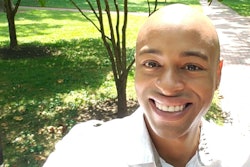SAN FRANCISCO
Before he transferred to San Francisco State
So it came as a pleasant surprise when he discovered his new college offered not only classes such as Homophobia and Coming Out, Gay Love in Literature and Queer Art History, but a full-fledged undergraduate minor in lesbian, gay, bisexual and transgender studies.
“One of the things I’ve learned is that homosexuality was around way back in ancient times,” said Loredo, 24, who enrolled last week in a sociology class called Queer Cultures and Society.
“Before, I thought homosexuality was started in the early 1970s.”
San Francisco State was one of the first U.S. universities to plumb the scholarly potential of gay lives, starting with a single English course in 1972. But with issues such as same-sex marriage, gays in the military and the peccadilloes of politicians continuing to divide public opinion, other schools also are choosing to put them in an academic context.
After years of offering a smattering of gay-related classes, at least 30 public and private colleges now offer multidiscipline minors in LGBT studies, the majority of them established within the last three years. They range from DePaul University in Chicago, one of the nation’s largest Roman Catholic universities, to five of the 10 campuses in the University of California system.
Another 16, including Ivy Leaguers Yale and Cornell, allow undergraduates to earn certificates or to pursue concentrated studies in lesbian and gay subject matter.
The field has become so ubiquitous on campuses that Dr. John G. Younger, a University of Kansas classics professor who maintains a Web site devoted to gay studies, said he stopped counting the number of schools that offer occasional sections in lesbian literature or gay history.
“I began thinking maybe it’s useless to keep this list because every university probably has something,” said Younger, who travels the country advising colleagues on how to gain administrative approval for their proposed gay studies programs.
The expansion has given a discipline once limited to history, English or women’s studies departments a place across the curriculum, encompassing subjects such as religion and the law. Younger said one of the most interesting combinations he’s come across was an anthropology course at Duke University on “queerness in advertising.”
Last year, a Carnegie Mellon professor decided to use polls and studies of gay people as the basis for his freshman statistics seminar. One lesson involved asking students to guess how many people in the class were gay as a way to test their “gaydar.”
Helping fuel the rise of these specialized degree programs are endowments from gay alumni, the research of openly gay and lesbian professors and demands from students who are coming out of the closet — and rejecting conventional notions of sexuality — at younger ages, academic experts say.
Dr. Steven Seidman, a sociologist based at the State University of New York at Albany, said he has observed a shift in the makeup of students who take classes such as Sociology and Sexuality or Introduction to Lesbian and Gay Studies.
In the past, the offerings drew primarily straight women and a handful of students who identified as gay or lesbian, almost all of them White. Now, the coed class rolls include young scholars of varying races who often refuse to be pigeonholed by the traditional labels of sexual orientation and gender, according to Seidman.
There is no giggling, and there is no debate about whether homosexuality is normal or whether lesbians and gays should have rights, he said.
“For the most part, people in these classes are open, they are self-accepting and they are not afraid to major in this area, and that’s generating a huge demand,” Seidman said.
At San Francisco State, sociology professor Jennifer Reck said she had 55 upper division students vying to get into her Queer Cultures and Society course, a survey of how gays and lesbians “respond to and influence broader society,” both historically and in current affairs. She had to turn at least 10 away.
Reck said the wide acceptance such subjects have found in academia is not universal, using her own experience as a doctoral candidate at the famously liberal University of California, Santa Cruz two years ago as an example.
“I had advisers actually tell me I shouldn’t study this area because it would not make me marketable for the future,” she said. “Luckily, I had others that were very sympathetic, who said, ‘If we never study these areas, how are things going to change?’”
– Associated Press
There are currently 0 comments on this story.
Click here to post a comment
© Copyright 2005 by DiverseEducation.com















